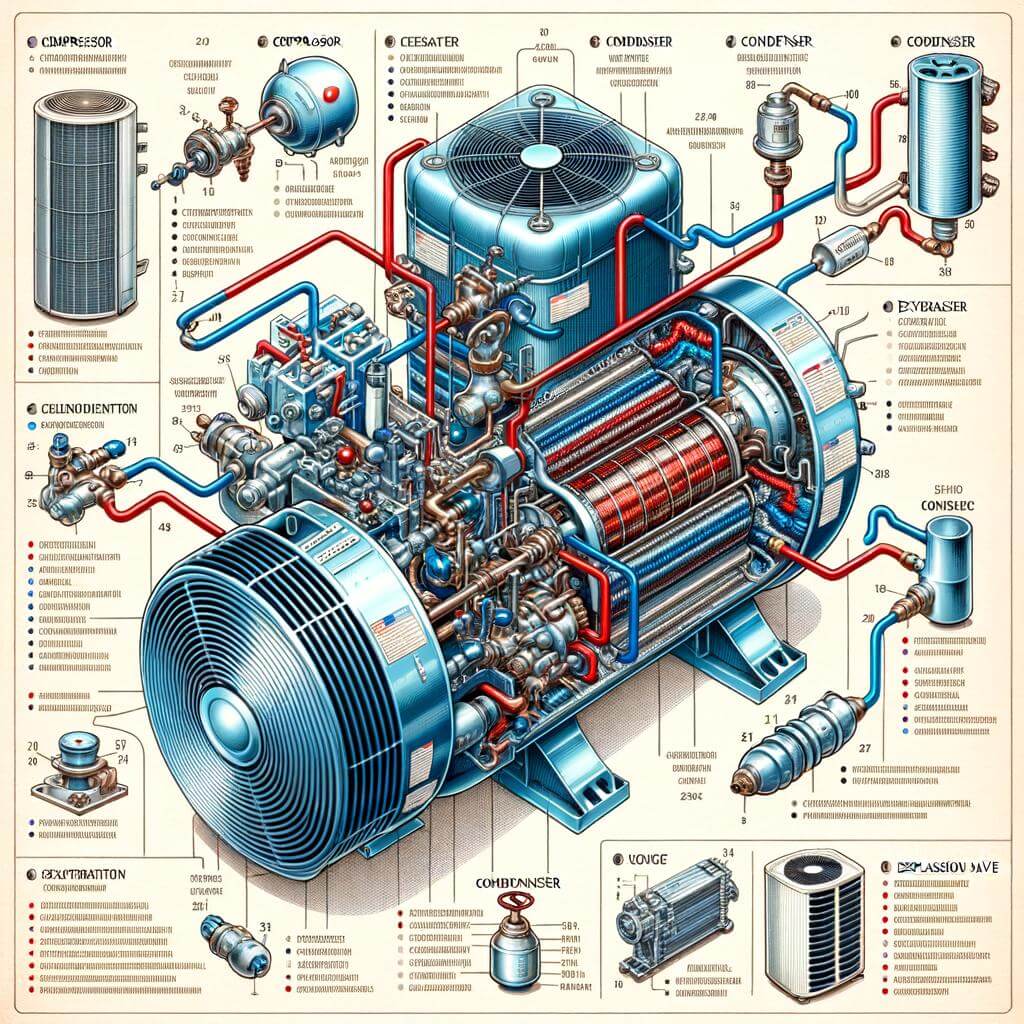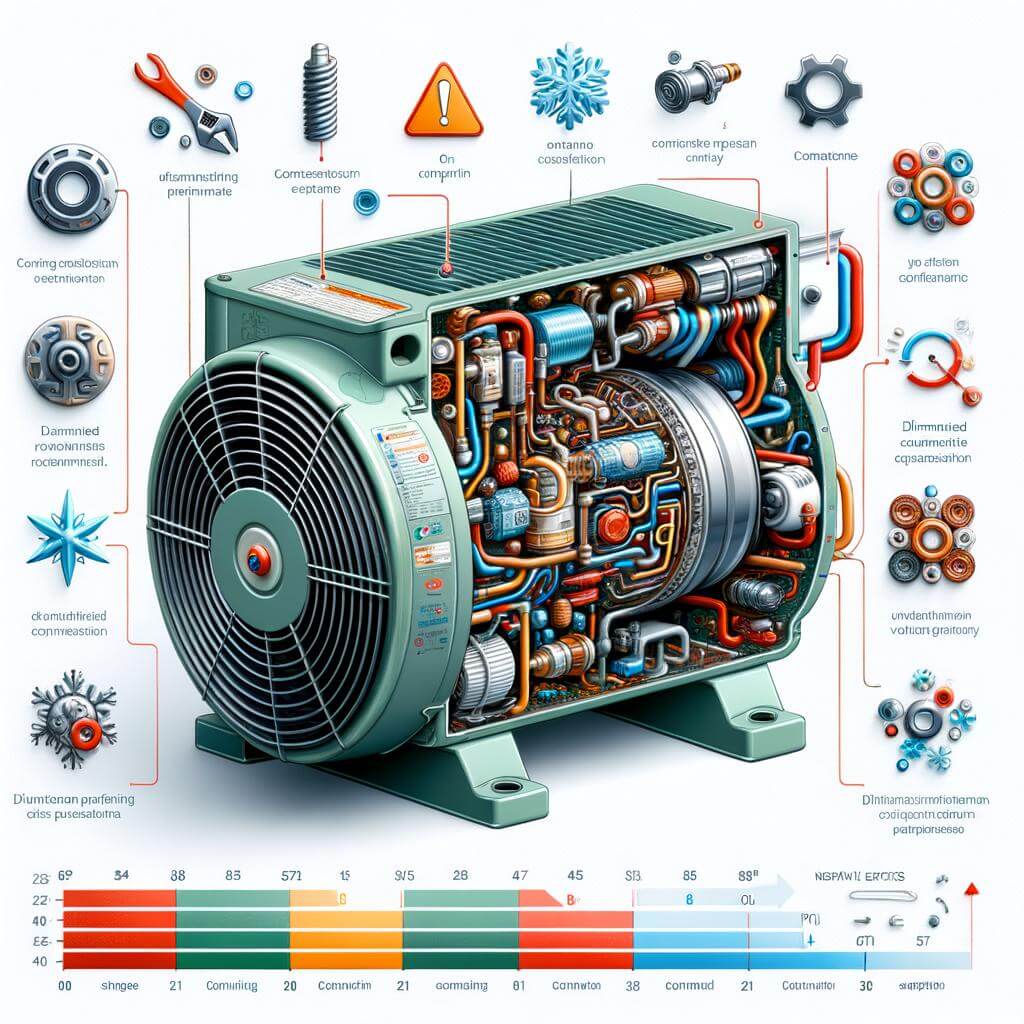Welcome to our engaging and informative post titled, ‘Understanding the Crucial Role of Compressors in Home AC Systems’. This comprehensive guide is designed to impart crucial knowledge about the indispensable role that compressors play in the functioning of your home air-conditioning systems. Loaded with expert opinions and fact-based explanations, this post provides you with a clearer understanding of how your AC system works and why maintaining your compressor is vital. By making this information easily accessible and simple to understand, we hope to help you handle problems related to AC compressors more efficiently and potentially save on unwarranted repair costs. Read on to expand your knowledge base and make the most out of your AC system!
Understanding the Function and Importance of Compressors in Home AC Systems
Often overlooked in the day-to-day running of a home, the compressor in your AC system actually plays an integral role in keeping your home cool and fresh. It is the component responsible for circulating refrigerant, the substance that absorbs and removes heat from your home and hence can quite aptly be labeled the “heart” of the system. A deeper understanding of its function can help you appreciate what goes into maintaining a comfortable temperature behind your walls.
In simple terms, the compressor in your AC system intakes refrigerant in a low pressure, low temperature, gaseous state and transforms it into a high pressure, high temperature gas. This change in pressure allows the refrigerant to absorb heat from the interior of the home so it can be expelled outside. And that’s not all, apart from regulating temperature, it also controls humidity levels, creating a comfortable living environment within your home. Thus the compressor, alongside components like the evaporator and condenser, forms a crucial part of the AC system. Failure or malfunction of the compressor can result in a reduction or complete loss of cooling ability. Therefore maintaining and paying attention to signs of compression failure are equally salient.
| Signs of Compressor failure |
|---|
| 1. Strange noises from the unit |
| 2. Reduced cooling capability |
| 3. Circuit breaker constantly tripping |
| 4. AC system frequently starting and stopping |
In summary, the compressor is an essential component within your home’s AC system. To ensure the optimal performance of your system and its longevity, regular maintenance is highly recommended. This includes cleaning the air filters, checking for leaks, and ensuring proper insulation. Any issues or irregularities should preferably be addressed by a licensed HVAC professional to avoid damaging the system further.

Key Components of an AC Compressor and Their Roles
The heart of any air conditioning system is the compressor. It is responsible for circulating refrigerant throughout the system, and without it, your home would remain hot and stuffy. In this post, we’ll examine the main components of an AC compressor and explain their roles.
Motor: If we liken the AC system to the human body, the motor is the heart. The motor drives the entire compressor, powering its operation and enabling it to pump refrigerant through the system. It’s an electric component, and its usefulness lies in transforming electrical energy into kinetic energy Pump: This component compresses the refrigerant, increasing its pressure and temperature before it moves to the condenser. There are different types of pumps used in AC units, each with its specific benefits and features. Condenser: A vital component that transforms high-pressure gas into a high-pressure liquid. This change in state is essential for the cooling process to occur efficiently.
| Component | Role |
|---|---|
| Motor | Transforms electric energy into kinetic energy |
| Pump | Increases pressure and temperature of the refrigerant |
| Condenser | Transforms high-pressure gas into a high-pressure liquid |
In conclusion, an optimal functioning AC compressor comprises intricate parts and systems working coherently to provide a cool and comfortable environment. Understanding the role of each of these components can help you troubleshoot any issues with your AC unit, ensuring you enjoy a fresher and cooler home.
How Compressors Influence the Efficiency of Your Home AC System
Often overlooked, the compressor actually plays a pivotal role in enhancing the efficiency of your air conditioning system. Not only does it initiate the cooling cycle, but it also maintains the pressure of your AC unit to facilitate optimal energy consumption. There are essentially two main types of air conditioner compressors; the reciprocating compressor and the rotary compressor.
The reciprocating compressor, often used in small to medium-sized homes, operates by decreasing the space that the gas occupies, compressing it, and increasing its temperature. They tend to be more cost-effective, hardy, and less likely to overheat, making them ideal for continuous use. On the flip-side, the rotary compressor uses a different approach. It operates by trapping refrigerant in a part of the rotating motor, compressing it and releasing it as cooler air. Rotary compressors are more efficient, quieter, and are suited to large, high-demand environments.
| Compressor Type | Application | Advantages |
|---|---|---|
| Reciprocating compressor | Small to medium-sized homes | Cost-effective, Hardier, Less likely to overheat |
| Rotary compressor | Large, high-demand environments | More efficient, Quieter |
When you understand the role and functionality of these compressors, you can make informed decisions that significantly impact the efficiency of your AC system. Remember, a properly working compressor not only enhances the performance of the system but also saves on energy costs, thus ensuring a comfortable and cost-effective environment in your home.

Compressor Problems and their Impact on Home AC Performance
Your home AC system’s performance heavily relies on the state of its compressor. This vital component is responsible for compressing the system’s refrigerant, which absorbs and dissipates heat throughout your home. Any snag or malfunction in this crucial part can lead to subpar AC performance or complete breakdown. Below are some common compressor issues that can lead to poor cooling performance.
- Inadequate Lubrication: Without sufficient lubrication, the compressor’s parts can grind against each other, leading to potential damage and decreased efficiency.
- Overheating: Frequent overheating can cause the compressor to eventually fail, forcing the entire HVAC system to work harder.
- Electrical Problems: These can lead to short-circuits or burnouts, which can cause the compressor to malfunction.
| Problem | Impact |
|---|---|
| Inadequate Lubrication | Reduced AC Efficiency |
| Overheating | Compressor Failure |
| Electrical Problems | Short-Circuits or Burnouts |
While all these issues can impact AC performance, some can also pose a risk to your unit’s longevity. Regular maintenance is paramount to the efficacy of your compressor. Scheduling regular service checks with an HVAC professional can go a long way in ensuring you dodge such malfunctions. A skilled technician will detect any potential issues during these checks and nip them in the bud, ensuring your compressor remains in top form, hence maximizing your AC’s efficiency. However, you can also do your part by ensuring the unit is clean, the filters are regularly replaced, and the outdoor units aren’t obstructed. In light of these, it’s clear understanding your compressor’s condition is vital in managing your home’s cooling needs.
Professional Tips for Maintaining the Health of Your Compressor
Compressor longevity, efficiency and health can be hugely impacted by a few simple yet often overlooked steps. The primary key to keeping your AC’s compressor in great shape is regular maintenance. A well-maintained compressor does not only ensure the performance of the entire air conditioning system but also helps to avoid costly repairs and extends the lifespan of the system.
Maintenance Tips for Your Compressor
Here are some professional tips you should consider for maintaining your compressor’s health:
- Regular Cleaning: One basic maintenance routine includes regular cleaning of both the compressor and entire AC unit. Over time, dust, dirt, and various debris can accumulate on your compressor, which might interfere with its functionality.
- Periodic Inspections: Professionals in the HVAC industry suggest having your AC unit inspected by a HVAC professional at least once or twice a year. The inspections enable early detection of possible defects that might escalate into more serious problems if not addressed on time.
- Change Filters: The condition of your AC’s filters is directly proportional to the system’s performance. Clogged or dirty filters force your compressor to work extra hard, leading to increased wear and tear. Therefore, it’s best practice to change your filters about every month or two.
Of course, there is no one-size-fits-all strategy when it comes to compressor maintenance. Different systems may require varying maintenance schedules and methods. The complexity of an AC unit often calls for professional insight and services.
| Common Compressor Issues | Preventative Measures |
|---|---|
| Overheating | Keep the surrounding area of the unit clean and unblocked to allow proper airflow |
| Refrigerant Leakage | Regular professional inspections to spot leaks early |
| Electrical Failures | Use of surge protectors and regular inspection of wiring |
Remember, a healthy compressor is integral for an effective and efficient air conditioning system. Protect your investment by adopting these maintenance routines, detecting issues early, and addressing them promptly.
Choosing the Right Compressor for Your Home AC: Expert Recommendations
Your air conditioner’s compressor is the heart of your home’s cooling system. Essentially, it’s responsible for propelling refrigerant throughout the AC unit, taking in the hot air from your home, removing the heat, and then circulating the cool air back into your home. Choosing the right compressor is pivotal for efficiency, cost-effectiveness and ensuring a comfortable living environment.
There are several types of compressors to consider, with each having its distinct features and applications. Reciprocating compressors are most common in smaller residential AC units. They’re valued for their durability and high-efficiency levels, but can become noisy over time. Scroll compressors, on the other hand, are quiet, smooth-running, and reliable, but more expensive. Then there are Rotary compressors and Screw compressors. Whilst the former is perfect for small cooling loads, for their compactness and economical operation, the latter are generally reserved for large scale, industrial applications due to their high cooling capacities.
| Type of Compressor | Features | Best For |
|---|---|---|
| Reciprocating | High efficiency, durable, can be noisy over time | Small residential AC units |
| Scroll | Quiet, smooth, reliable, expensive | High-end residential or small commercial units |
| Rotary | Compact, economical | Small cooling loads |
| Screw | High cooling capacity | Large scale, industrial applications |
It’s important to note that the best compressor largely depends on your specific needs, which include the size and cooling requirements of your home, durability, and noise tolerance. Additionally, energy efficiency and ongoing maintenance costs impact your choice, hence it pays to consult with an AC expert for personalized advice and recommendations.
Concluding Remarks
In conclusion, understanding the crucial role of compressors in home AC systems can significantly optimize your approach to AC maintenance, rectify malfunctions early, and ensure prolonged, efficient usage. Compressors serve as the heart of AC systems, pumping refrigerant through the system to cool and condition your home. They directly impact system performance, power usage, and the overall comfort level of your home. Therefore, keeping them in top-notch condition is essential for your AC system to function effectively and efficiently. Remember, a well-informed homeowner is an empowered one. Continue to learn more about your household appliances and systems. It’ll be an investment that pays off in comfort, efficiency, and potential savings – keeping your home cool and your mind at ease.




